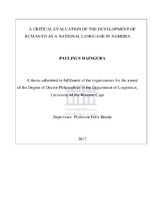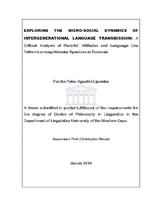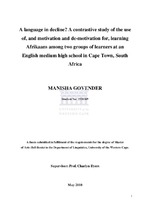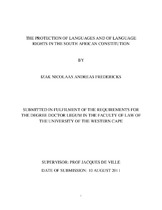A critical evaluation of the development of Rumanyo as a national language in Namibia
Abstract
Among others, the current study had been conceived due to the fact that, although Namibia is
endowed with multiple languages, their development throughout the long colonial history, had
been unequal. That is, some languages received more attention than others and some were
hardly developed at all. After independence, Namibians had legitimate expectations that all
their (different) languages would be developed equitably throughout all the regions, and among
all ethnic groups or speech communities. In the post-apartheid era, however, Namibians have
been subjected to a limited and unequal language and literacy development which encouraged
me to conduct a research to critically evaluate the development of Rumanyo or lack of thereof.
The focus of this study is on understanding the disparities in language and literacy
development in Namibia with particular emphasis on ethno-regional disparities and what
precipitates these inequalities. The reason for the emphasis on region and ethnicity in
researching language and literacy development was due to Namibia's multi-ethnicity and the
over-lapping of regions and ethnic groups.
Related items
Showing items related by title, author, creator and subject.
-
Exploring the micro-social dynamics of intergenerational language transmission: a critical analysis of parents's attitudes and language use patterns among Ndamba speakers in Tanzania
Lipembe, Pembe Peter Agustini (University of the Western Cape, 2010)The study has several implications; for general theoretical traditions it highlights the point that ambivalent attitudes and incomplete language use are responsible for gradual language decline. Previous studies while ... -
A language in decline ? :a constrastive study of the use of, and motivation and de-motivation for, learning Afrikaans among two groups of learners at an English medium high school in Cape Town, South Africa
Govender, Manisha (University of the Western Cape, 2010)Afrikaans in practice replaced Dutch and became one of South Africa's official languages (along with English) from 1925. It reached the apex of its development and influence during the years of Nationalist party rule and ... -
The protection of languages and of language rights in the South African constitution
Fredericks, Izak Nicolaas Andreas (University of the Western cape, 2011)The 1996 South African Constitution contains a number of provisions that deal specifically with the protection of languages and of rights relating to language. The most important of these is section 6 which recognises 11 ...




